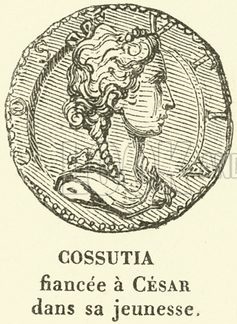Cossutia | |
|---|---|
 Cossutia, fiancée of Julius Caesar | |
| Born | |
| Died | As early as 84 BC Possibly in Pisa |
| Known for | Possibly being the first wife of Julius Caesar |
| Spouse | Julius Caesar (disputed) |
Cossutia was a Roman woman who became engaged to Julius Caesar prior to his reaching adulthood. There has been debate among historians on whether the marriage actually occurred.